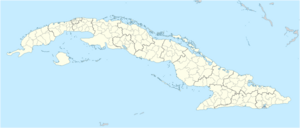Municipalities of Cuba facts for kids
Cuba is a country in the Caribbean Sea. It is divided into areas called provinces, and these provinces are then split into smaller parts called municipalities (which means municipios in Spanish). Think of municipalities as local towns or districts within a larger province.
Cuba has 168 municipalities in total. These areas were first set up by a special law in 1976. Later, in 2010, some changes were made. For example, the municipality of Varadero was removed, and two new provinces were created: Artemisa and Mayabeque. These new provinces took the place of the old La Habana Province.
Provinces and Their Municipalities
Here is a quick look at Cuba's provinces and the municipalities that belong to each one:
| Province | Municipalities |
|---|---|
| Artemisa Province | |
| Camagüey Province | |
| Ciego de Ávila Province | |
| Cienfuegos Province | |
| Granma Province | |
| Guantánamo Province | |
| Havana |
|
| Holguín Province | |
| Isla de la Juventud | Isla de la Juventud (seat: Nueva Gerona) |
| Las Tunas Province | |
| Matanzas Province | |
| Mayabeque Province | |
| Pinar del Río Province | |
| Sancti Spíritus Province | |
| Santiago de Cuba Province | |
| Villa Clara Province |
Municipal Maps
These maps show the different municipalities within each province of Cuba. The yellow areas show the municipalities, and the red dot shows the main city or capital of that province.
Note:
- Havana is a special case because it is both a city and a province. It has 15 smaller areas called municipal boroughs.
- Isla de la Juventud (Island of Youth) is also special. It is a single municipality that acts like its own province.
See also
 In Spanish: Municipios de Cuba para niños
In Spanish: Municipios de Cuba para niños
 | Delilah Pierce |
 | Gordon Parks |
 | Augusta Savage |
 | Charles Ethan Porter |


















